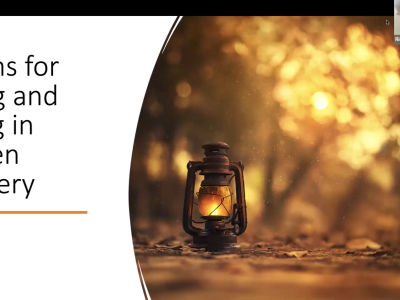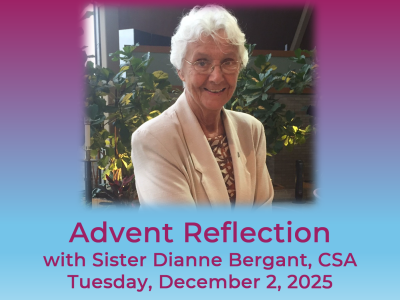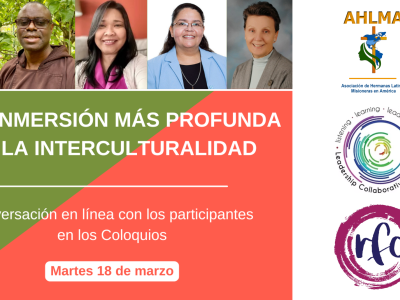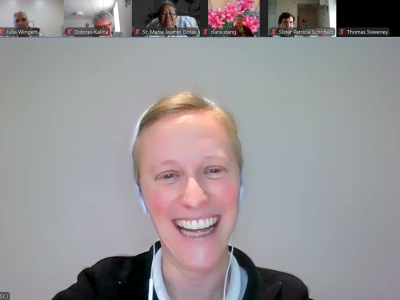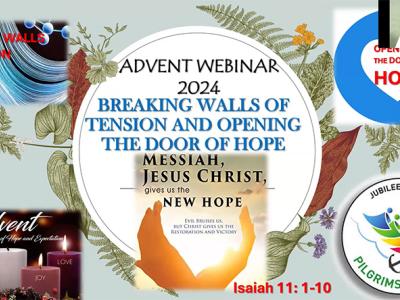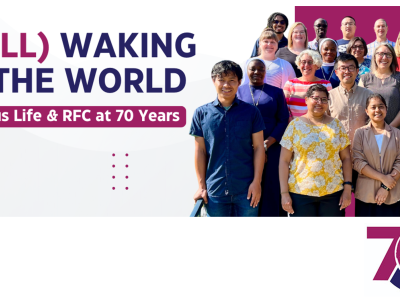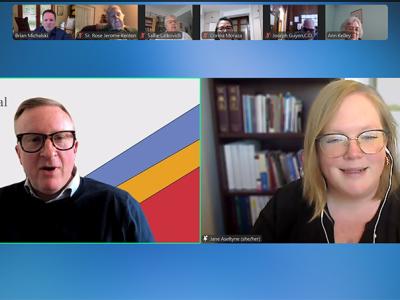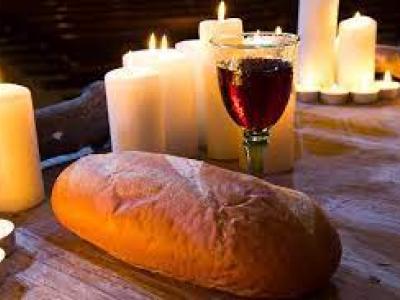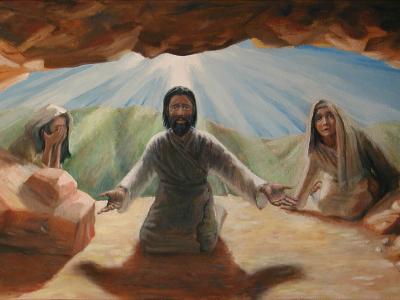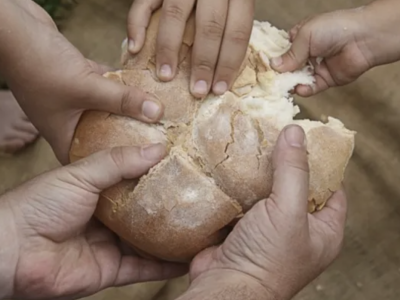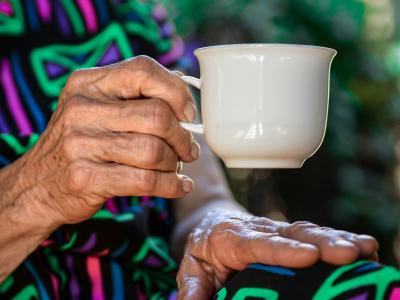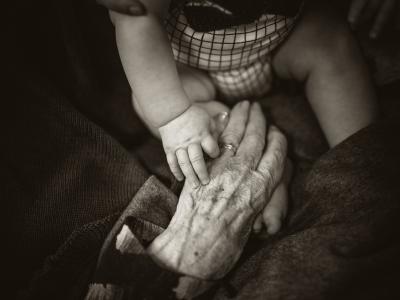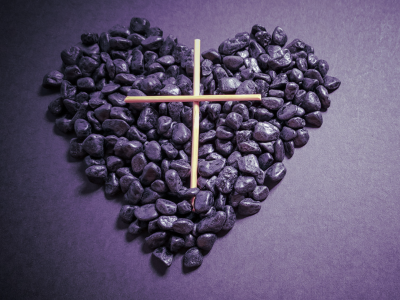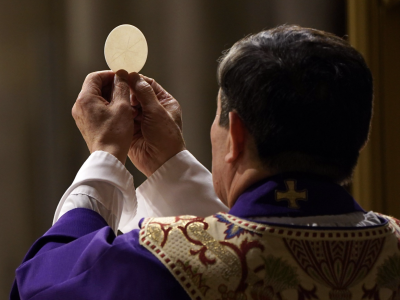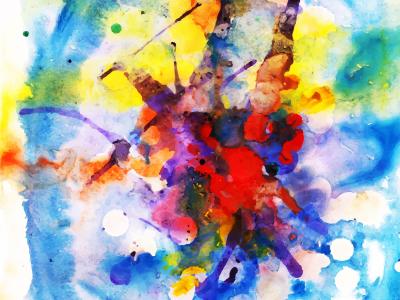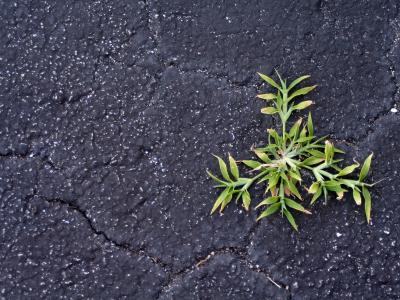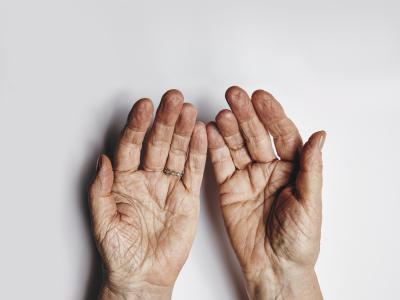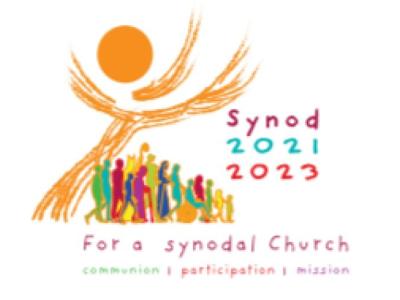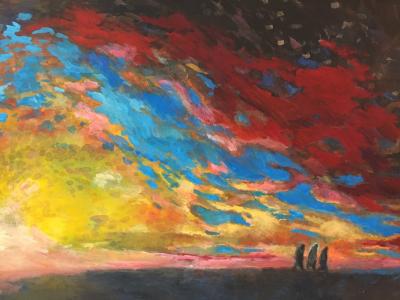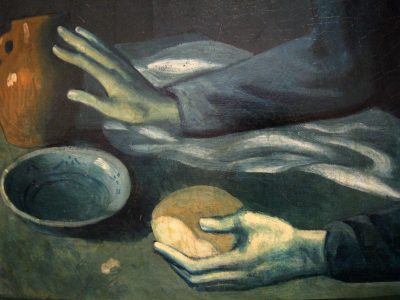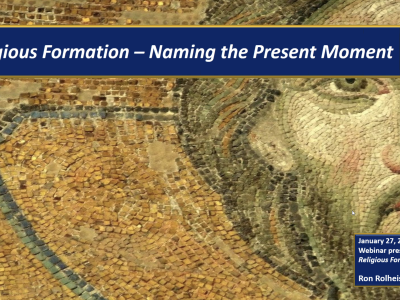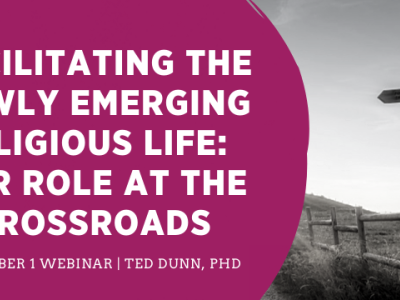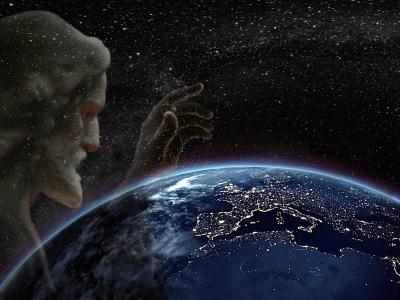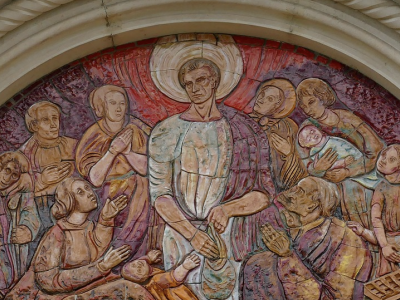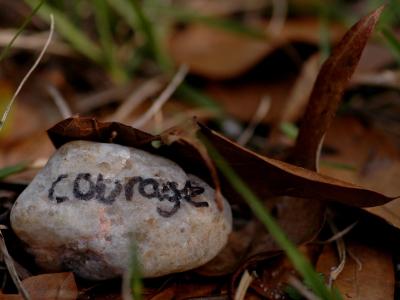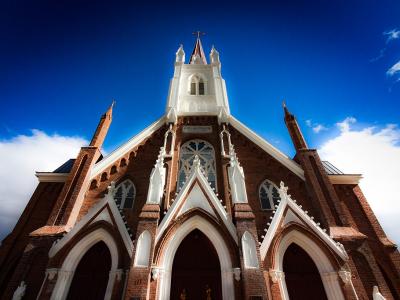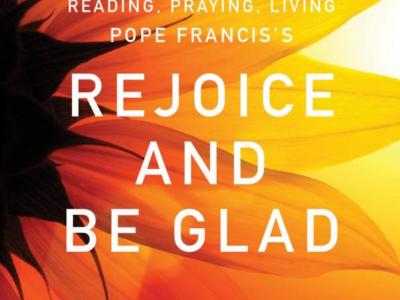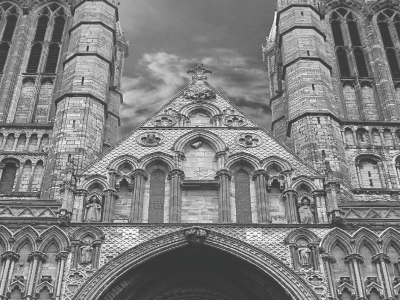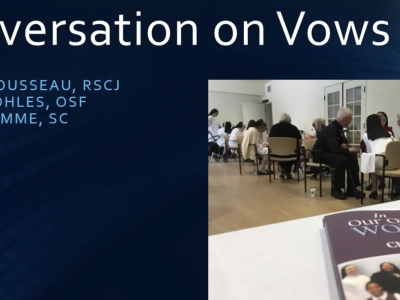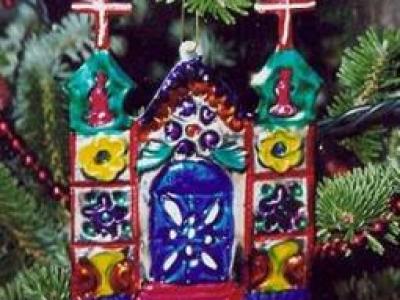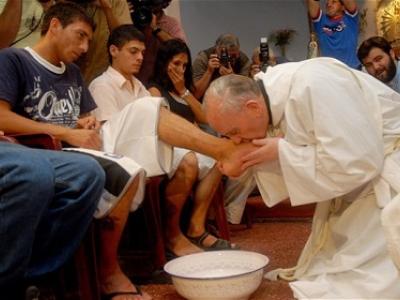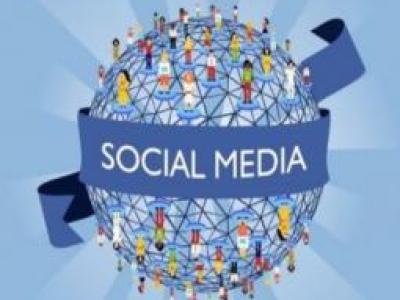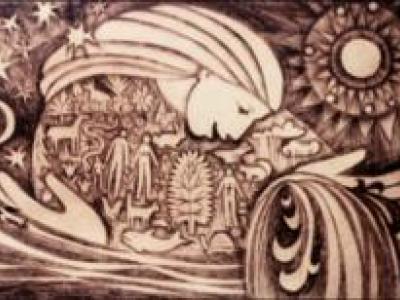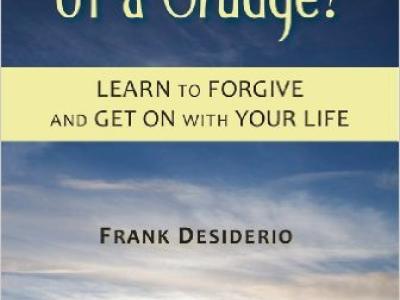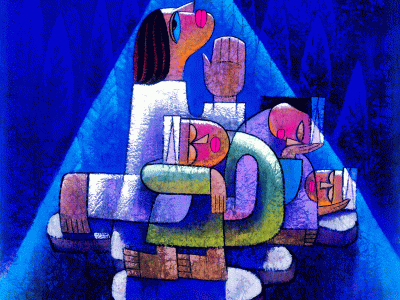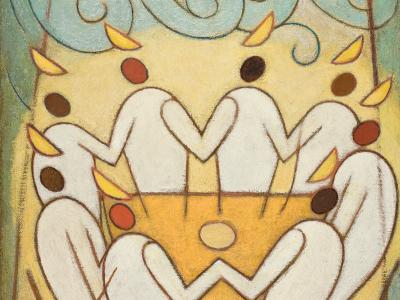If your community is a member, please use your institute's congregational login to access the archived webinars free of charge and to secure the member rate for the video presentations.
If your congregation is not a member, you can purchase webinars and presentations for a nominal cost. Create an account, add items to your cart, check out with payment, and access content.
RFC’s content for purchase is provided in the form of video stream off our website (no CD, DVD, etc. is made available). This allows users to access the material immediately. After successful payment, content is made available to whichever user is currently logged in. All videos that are purchased and available will display "watch now" in the list (instead of "add to cart").
In this Lenten reflection, Fr. Richard Fragomeni invites us to enter the Paschal Mystery through the lens of poetry—where language becomes a doorway into the deepest movements of the human heart. Together, we will explore how poetic imagination illuminates the realities of death, loss, hope, and rising to new life.
Sister Dianne Bergant, CSA, invites us to enter more deeply into the Scripture readings that shape this sacred season. Drawing from her deep knowledge of biblical theology and years of teaching and writing, Sister Dianne explores how the prophets, psalmists, and Gospel writers awaken in us a spirit of hope, longing, and readiness for God’s coming.
A principios de este año, la Asociación de Hermanas Latinas Misioneras en América (AHLMA), Leadership Collaborative (LC) y la Religious Formation Conference (RFC) publicaron el informe «Interculturality and Intercongregationality in Religious Life: Conclusiones y recomendaciones de una serie de coloquios sobre buenas prácticas». El 18 de marzo, los autores del informe y algunos participantes en los coloquios se reunieron en línea para mantener una conversación que profundiza en las principales conclusiones del informe y explora sus preguntas emergentes para la vida consagrada.
Earlier this year, the Asociación de Hermanas Latinas Misioneras en America (AHLMA), Leadership Collaborative (LC) and the Religious Formation Conference (RFC) published the report "Interculturality and Intercongregationality in Religious Life: Findings and Recommendations from a Colloquia Series on Best Practices." On March 18 the report’s authors and a few colloquia participants gathered online for a conversation that dives into the report’s main takeaways and explores their emerging questions for consecrated life.
Sister Kathryn Press, ASCJ, addresses the Jubilee Year theme, "Pilgrims of Hope." Pope Francis announced that 2025 will be a Jubilee Year for the international Church. The theme for the 2025 year is “Pilgrims of Hope”. Even amidst the challenges of our world, St. Paul reminds us that “hope does not disappoint” (Romans 5:5). Participants reflected on what it means to be pilgrims of hope, read the signs of the times, and ask what unique contribution men and women religious can offer to today’s world.
We invite you in these final weeks of Advent to use and watch this webinar as a reflection and invitation for us as pilgrims of hope. It is a great opportunity and grace to be used for prayer by yourself or with others as our presenter, Sister Mary Justine Naluggya, IHMR, PhD, proposes questions for us to consider during this Advent season. Watch video with Spanish interpretation
On Wednesday, Nov. 13, RFC hosted a virtual 70th anniversary celebration. The evening included prayer and conversation, with input by Sister Nicole Trahan, FMI, EdD, and Brother Patrick Sean Moffett, CFC, PhD. Sister Nancy Gerth, SCN, moderated discussion. We also shared a video collage of snapshots of "RFC Through the Years."
Presenter: Dr. Steve Millies, PhD, director of the Bernardin Center at the Catholic Theological Union, Chicago. The consistent ethic of life is a fully Catholic engagement with the difficult challenges that conscience encounters in our time. Based on the speaker’s book, this webinar will focus on rediscovering the consistent ethic now in this challenging, divided moment of our history.
How can the story of Lazarus invite us to leave behind what might prevent us from embracing the transformative change to which God is calling us as we age individually and congregationally? How can it offer us new life? And what can we know about Lazarus--and his sisters Martha and Mary? Fr. James Martin, SJ explores the answers to these questions and more.
How can the story of Lazarus invite you to leave behind whatever prevents you from following God more closely?
How can it offer you new life?
And what can we know about Lazarus--and his sisters Martha and Mary?
This webinar conversation explores the answers to these questions and more.
Recognizing the real presence of Jesus in the Eucharist invites us to believe that we remember his self-giving when we, like him, let ourselves be broken and allow our blood to be shed in daily self-giving, when we recognize his real presence in each of “the least of these” and make the Word come alive: "For I was hungry and you gave me something to eat, thirsty and you gave me something to drink, a stranger and you gave me shelter, naked and you clothed me, sick and you visited me, in prison and you came to visit me" (Mt 25:35-36).
What are we to make of the “golden years” of our lives? Women and male religious have so many more opportunities for enrichment than the average person. If this is the case, then why are there so many of them who question their fundamental value? There is a difference between valuing what we do and who we are. Which side of this question do we stand?
We, as religious, all share a responsibility to age well together. Have we looked at inter-generational challenges realistically in our religious communities? Do we provide education in aging throughout formation? Have we answered the call to embrace aging gracefully? In this session, we will discuss practical ways to balance Community life and ministry, offering ongoing formation that addresses aging issues, and exploring the concept of transitioning from doing to being.
Could planning be used as a spiritual discipline? We have all engaged in strategic planning, futuring, visioning and discernment. How do we look at these exercises from a spiritual perspective? What kind of discipline do we need? Is there a point where we are trying to control the Spirit? This session will draw on resources from our tradition which might inspire Spirit-filled planning to address the eldercare needs and offer quality of life opportunities to our aging women and men religious.
We have another opportunity to stop, relax, retreat, and recharge this precious gift of life as this Lenten season approaches. We are living in difficult and trying times, yet we are called to be agents of joy and love to the world. As religious men and women, we have said YES to God’s invitation to this call of Love and we share the joys of this call with others through our ministry in Love. This webinar invites us to a sober reflection as we explore our lives as a channel of Love.
At first glance, the topic of synodality might appear to belong somewhat narrowly confined to the arena of church governance. In particular, it could be considered an issue that concerns the relationship between the pope and bishops. Thus, synodality apparently has little to do with the ordinary lives of the baptized. As multiple church leaders and theologians – including Pope Francis - have noted, however, synodality, is not simply about certain aspects of church governance but more broadly about how we are church together, and consequently about our shared participation in God’s mission for the church.
Thin places in Irish lore are “portals” that open the past in a deeper way. Thin times are special times where we are open for the first time, or once again, to an experience of wonder. We often experience “betwixt and between” times where there are crossroads, past and present, light and dark. As religious we are in times of “ambiguity, paradox, and fluidity”. Religious who are retiring from full engagement in active ministry today have lived some time in the culture of the past but have stepped into a new way of living what once was.
This session builds on Sr. Chris’s dissertation research entitled Staying Connected and Letting Go: Quality of Life for Elderly Nuns in Convent Care Centers and focuses on the unique challenges aging religious face as they approach moving from full-time or part-time ministry because of aging or health issues. Sr. Chris's premise is that while religious may retire from full-time or part-time ministry, they do not retire from living out the charism of their institutes and participating in its mission.
Reflection Questions
One of the greatest gifts leaders of women religious can share with their fellow religious sisters is a sense of their own resilience …but they can’t share what they don’t have. By discussing psychological and classical spiritual approaches to maintaining a healthy perspective in challenging times, Dr. Wicks, an expert on the prevention of secondary stress (the pressures experienced in reaching out to others) offers insights into how persons in leadership roles can reach out to colleagues and those they are called to guide without losing their own inner fire in the process.
In mainstream American society, aging is presented as a “problem,” a state to be avoided as long as possible, a state that threatens one’s ability to maintain independence, autonomy, control over one’s surroundings. Aging “well” (or avoiding aging) has become a twenty-first century American preoccupation. Epidemiologists and gerontologists have dedicated considerable research to understanding why some people age “well” while others do not. Studies have demonstrated that statistically American Catholic Women Religious experience better health outcomes than their lay peers. Dr. Corwin’s research argues that what is remarkable about women religious is not only their health outcomes, but how they achieve these outcomes.
The interactive session focused on introducing “spirituality” as both Christian experience and formation. The presenter will then turn our attention to some of the more central issues to understanding U.S. Latin@ spiritualities: Jesús en la Cruz (Jesus on the Cross), María en la luz (Mary in the light), and el Cotidiano as locus theologicus (the Cotidiano as God's location)
We often long for healthy relationships in religious life. This webinar will focus on the care of the many relational dynamics experienced throughout religious life. We will highlight aspects of attachment theory that hinders and supports living healthily and authentically with one another. As formators, leaders, and ministers, there are tools and skills that give us the ability to engage in caring for ourselves and our relationships. We invite you to join us and deepen Jesus’ invitation to “love one another as I have loved you.
Cinema divina, or "sacred viewing," is a newer spiritual practice that has emerged from contemporary monasticism. Benedictine Matthias Neuman wrote in 1977 that "Beyond the written word, the giant visual image of the modern movie screen may provide the impetus for an authentic lectio.” Following the movements of lecio divina and using Leviticus 19:34 and clips from the film "The Visitor," Sr Rose will show us how Cinema Divina is to experience the ineffability of grace in the world. (Please feel free to see "The Visitor" ahead of time; available on Amazon Prime or Netflix DVD).
The title comes from the 1989 address given by Sr. Thea Bowman, FSPPA, Ph. D, at the meeting of the United States Conference of Catholic Bishops. Sr. Thea’s speech started with her asking the question, “What does it mean to be Black and Catholic?” and her answer was her singing, “Sometimes I Feel Like a Motherless Child.” The rhetorical strategy that Sr. Thea employed can be useful as we consider our strategies for renewing and adapting the work of vocation recruitment within congregations, communities and orders of vowed women and men in our church today.
A collaboration of the Religious Formation Conference and the Asociación de Hermanas Latinas Misioneras en América (AHLMA), this webinar with Dr. Rafael Luciani, PhD, a Venezuelan layman, took place on Tuesday, January 11th from 1:00-2:00pm central time. Pope Francis has said that "the path of synodality is the path that God expects from the Church of the third millennium." The Pope is inviting us to discern a new ecclesial model.
Advent is a time of preparation for joy that has the possibility of changing our lives. In the midst of the current reality, COVID with its uncertainty illness, and death; Climate change with its catastrophic storms, floods, fires, and displacement; demographic and other changes in religious life, reduced energy, and questionable futures, how do we prepare for joy? Advent gives us a clue with a rising star that led the wise ones to Emmanuel, God with Us.
A significant component of our charisms as members of religious communities involves being intentional about accompanying those who have been marginalized. In order to do this well, we must consider how past, present and future actions inform the ways we approach issues of justice. Utilizing a lens of racial justice, this webinar will wrestle with the history and lessons of Jesuit slaveholding and the continued need to break down silence and complicity. The session will focus on community approaches to restoration, reconciliation, and mutual transformation.
In the middle of this winter’s darkness and social distance, in a period of Lenten renewal, we might find it hard to recognize God in our midst. Refining our skills of theological reflection is one critical way to attune our hearts to God’s presence. In 2014, Pope Francis said, “Our God is a God of surprises...” With this in mind, Christina Zaker will guide us to reflect on God’s movement in our lives. Drawing from the wisdom of the parables, she will encourage us to recognize God’s surprising nearness, explore what that nearness means and what it demands of us as Christians.
As we enter a new year, what is our present moment in terms of the issues we face within religious formation? What are our underlying assumptions about our world and our church? Where does our hope lie? In 2021 and beyond, what should be our agenda moving forward? This webinar is an an exercise in naming and explores our response as believers in Christ’s Good News.
The goal of this webinar will be to explore what it means to facilitate the emergence of a new Religious Life. • Graced Crossroads: pathways to deep change and transformation • Learning to cooperate with grace • Inner work of transformation During the season of Advent, we can wait in hope and wonder what a new Religious Life might look like or we can actively participate in facilitating its emergence. This webinar will explore what it means to facilitate the emergence of a new Religious Life by cooperating with grace and engaging in the inner work of transformation.
Who of us can doubt that we are all glaringly living the paschal mystery? Though the interconnecting consequences of Climate Change, COVID, systemic racism and pervasive violence seem to thrust DYING into the forefront, our faith demands from us the understanding that BIRTH and RESURRECTION are integral elements of the cycle. This session explores how that faith flows from the greater context of the Cosmic Paschal Mystery.
Maria Benavides, a senior at Ann Hall High School San Antonio, shares her encounter with refugees and migrant children at the bus station in downtown San Antonio, TX. As she listened to the voices and dreams of the children she discovered an inner passion for the work of social justice. Through the stories and eyes of the children, she awakened to a beauty and hope rooted in resurrection love.
In the document Misericordia Vultus (The Face of the Mercy of God), Pope Francis calls us to pattern our lives after the image of Jesus, who is the face of divine mercy. Dianne Bergant, CSA, PhD examines some of the biblical background of Pope Francis’ thinking on our call to embody divine mercy. Please note: this webinar does not have a visual presentation (powerpoint) or handouts as the presenter chose not to use these items. The video below includes only audio of Sister Dianne's presentation.
In this webinar Marcelline Koch, OP explores the season of Advent through the lenses of incarnation and solidarity.
In this webinar, Marianne shares her experience and teaching of a practice called Compassionate Listening. The practice grew out of work facilitated by Leah Green (rooted in the work of Quaker Gene Knudsen Hoffman) with reconciliation leaders on the ground in Israel – Palestine beginning in 1991. The reconciliation work in Israel-Palestine was adapted for peace-building in everyday life and the Compassionate Listening Project began in the U.S. in 1999. Marianne has presented the practice to formation personnel participating in the RFC ForMission Program.
In this webinar presentation, Father John Tourangeau engaged several topics related to clergy sexual abuse and the role and dynamics of power. He gave a brief sketch of the historical considerations and then explore the critical need for greater awareness of the dynamics of communal power through honest dialogue and ongoing education. How do we oppose the culture of power and clericalism in the formation process, for example? Fr. John will also covered how power is informed by Gospel values and Christian mission.
Fr. Dan Horan discusses his recent book on this encyclical by Pope Francis titled Reading, Praying, Living Pope Francis’s Rejoice and Be Glad: A Faith Formation Guide.
On Wednesday, March 20, 2019 the RFC hosted a Lenten webinar presentation and discussion with Massimo Faggioli, PhD. He gave an overview of his current work on the Catholic Church and sex abuse.
On Wednesday, December 5, 2018 the RFC hosted an Advent webinar presentation and discussion with Sister Barbara Jean Franklin, ASC.
On Thursday, September 13 the RFC hosted a webinar discussion with the editors of and an author in the book, In Our Own Words: Religious Life in a Changing World.
Presented by Religious Formation Conference (RFC) in partnership with Conference of Major Superiors of Men (CMSM) Part Three: Developing and Managing Intercultural Competencies Within Formation
Presented by Religious Formation Conference (RFC) in partnership with Conference of Major Superiors of Men (CMSM) Part Two: Dealing with Difficult findings and Difficult Realities
Presented by Religious Formation Conference (RFC) in partnership with Conference of Major Superiors of Men (CMSM) Part One: The Basics
Sr. Sallie Latkovich will lead us in an exploration of “spirituality” and “holiness” in the context of the Christian Lenten journey. She will reflect on the events of the Triduum, a three-day commemoration of Jesus’ passion, death, and resurrection, and how they form Catholic/Christian spirituality and act as catalysts to renew the faith community year in and year out.
As Church, we have put the “waiting” back into Advent through catechetical efforts to counteract a consumer-driven Christmas season. The amount of time that is dedicated to the joyous news of the Incarnation, however, is disproportionately small in comparison to the overwhelming gracious mystery of God-among-us. The unfolding of liturgical time after Epiphany is compacted and we return swiftly to “ordinary time.” This webinar looks to popular religious practices of the season as sources for theologizing resistant hope in troubled times.
In this complex time of ever-increasing diversity, we are continually faced with the possibilities of encounter and isolation. The natural tendency to relate only with people who share our cultural values and religious beliefs unconsciously reinforces ethnocentric isolationism, a room full of mirrors. Francis’ challenge to encounter the “other” – the one who looks, acts, and believes differently – moves us beyond our comfort zone to a greater self-awareness and the openness to see the world from another’s point of view.
En este tiempo complejo de creciente diversidad, nos enfrentamos continuamente con las posibilidades de encuentro o aislamiento. La tendencia natural de relacionarnos solo con la gente que comparte nuestros valores culturales y creencias religiosas refuerza inconscientemente el aislamiento etnocentrista, un cuarto lleno de espejos. El reto del Papa Francisco de encontrar al “otro” – el que ve, actúa y cree de manera diferente – nos mueve fuera de nuestra zona de confort a una mayor autoconciencia y apertura para ver el mundo desde el punto de vista del otro.
In this webinar, our presenters will explore prayerful contemplation of the visual arts.
This webinar will present the findings from a recent survey of sisters under 50 years of age who were invited to share their reflections on the transformation of religious life. The results of their reflections will be offered in this webinar in order to elucidate and amplify the voices of younger members, sharing what they see emerging on the horizon and enriching our collective understanding of the ongoing transformation of religious life.
Mindfulness been introduced and accepted into the mainstream of mental health treatment as an important tool in assisting the regulation of emotion, flexibility in responding to life situations, and the development of healthy relationships and self-concept. However, mindfulness has a deep religious context and origin as a spiritual tradition, including the Christian contemplative tradition. In this Advent webinar participants will explore mindfulness, as a Christian discipline and practice that helps us uncover the sacred in our everyday experience.
We stand at an evolutionary juncture that is fostered by a deep yearning to be co-creators of the Universe. Led by the energies of that first primordial fire of the Divine, we are in communion with the Universe, Earth, and God. We strive, as sexual beings, to evolve and engage in life, seeking deeper understanding, interconnectivity and love. In this webinar, participants will explore how these energies within ourselves and beyond have evolved from that first fire that drove evolution. We will explore what God has intended for us all along.
The impact of living in a digital world which is “always on” 24/7 is felt in all walks of life: consecrated life no less than the others!
This webinar will weave the Universe Story and the Paschal Mystery using art, poetry and theological reflection. The Great Flaring Forth of the universe is an invitation to contemplate how Divine Mystery enfolds the cosmos. On Earth Day and during the Easter Season, participants in this webinar will ponder and celebrate the mysteries of Deep Incarnation, Kenosis, Deep Resurrection and the Cosmic Story.
What do the Hebrew and Christian Scriptures tell us about the nature of a prophetic call by God and our response? How do the narratives of the Bible challenge us in terms of both initial and ongoing formation? This webinar will examine the call narratives of Isaiah, Jeremiah, Ezekiel, and Mary and seek to understand better how the stories of their call can deepen and enrich our own.
For members of religious communities retirement is often seen as a signal to be ‘recycled.” How do we respond to the too frequently asked question, “What do you do?” when ‘doing’ no longer fills our days? What is the invitation embedded in this life event we call retirement? We will consider some of the attitudes that impact our response, the ordinary phases that are to be expected, some suggestions on how to move through them and the potential of new life that lies beyond.
We live in an increasingly wireless world connected by screens: smart phones, tablets, laptops, TVs, to name a few. There is a potential to be connected to someone at every moment of the day on almost every place on earth. This webinar will address some of the "hidden costs" of connected living, in particular: healthy companionship, creativity and contemplation. This reality, sooner or later, surfaces for us personally and in ministry, but particularly in initial and lifelong formation settings.
Being resilient in the face of adversity requires us to look inward rather than outward and examine our approach, our expectations, and our reactions to situations. This webinar will focus on the following topics: the definition of resilience, the factors that enhance our ability to be resilient, the distorted scripts that lead to burnout, the difference between healthy vs. unhealthy self-sacrifice, and the importance of establishing a self-care plan.
Contemplating the gifts received when called into the vowed life will be the focus of this webinar. Our vows are a gateway into discipleship and communion. The challenge is to see the depth of meaning offered by each vow. According to Ilia Delio (2011) “heaven is not a place of disembodied spirits but an embrace of love that transforms this present earthly life with its frailties and weaknesses into the divine presence of enduring love….Heaven is not another world but this world clearly seen.” Come spend an hour clearly seeing the transformative nature of our vows.
Based on the recently released book, Can You Let Go of a Grudge? Learn to Forgive and Get on with Your Life (Paulist Press, January 2014) Fr.
On the way to the deep and full joy that Jesus desires for us, we feel profound anxiety, deep rage, powerful shame, and intense grief in response to the ordinary experience of life that can challenge our faith, shake our hope, and limit our love. This webinar will help participants to deepen awareness of our emotional lives as invitations to transformation, growth, wisdom and peace all opening us to deeper faith and genuine hope.
La integración de la diversidad de la Iglesia Católica en los Estados Unidos es vital para la transición al ministerio de aquellos/as que están migrando de Latinoamérica y el Caribe. Este “webinar” contrastará las características históricas y culturales que dieron forma a la Iglesia de los Estados Unidos con la Iglesia de América Latina, subrayando las contribuciones que cada tradición trae al ministerio hoy. La meta será explorar las competencias interculturales que el ministerio en los Estados Unidos requiere de todos/as.
Every person encounters the mystery of suffering in his or her life and in the lives of loved ones. Those of us who minister in the Church come face to face with this mystery often, as we are called to be present to those who suffer in different ways. Vowed religious are affected by the reality of suffering within religious community. This webinar will address the challenges of talking about God and talking to God in times of suffering.
Most of the theological and spiritual tradition that forms us as religious is based on a classical view of a static universe. As science reveals more about the world God created, we have the opportunity to deepen our understanding of God, ourselves, and the reality around us. The focus of this webinar is cosmology and how this new knowledge and consciousness informs the vowed life, lived in communion and for mission.We will discuss insights from cosmology and its significance for Catholic faith, spirituality, and religious life.
This webinar will focus on new legal questions religious congregations encounter today. These include such delicate topics as end of life decisions and issues which newer members who have raised families and/or had long careers before entering religious life may present: concerns about property disposal, inheritance, debts, contracts, and insurance. There will be an opportunity for webinar participants to raise questions and issues of concern to them.
Religious women and men take a vow of obedience that binds them to those with whom they share life. In the contemporary experience, discernment - both individual and communal - is extremely difficult and has few, if any, parameters. The webinar will explore a model of communal discernment that is centered in communion ecclesiology and that offers religious a model for engaging in communal discernment. *Image credit: The Coming of the Holy Spirit by Soichi Watanabe. Used with permission.
Often older religious comment “No one taught me how to do this time of life.” Called in Baptism to share in the mission of Christ, the spiral of call moves through all the different phases of discipleship. This webinar is designed to offer older religious a spiritual model of aging and support them in their desire toRe-vision/ re-vitalize their call into the second half of lifeFind meaning and purpose on their journey into radical discipleshipBecome a spiritually transcendent elder
This webinar will provide an overview of the immigration processes available for “religious workers.” In immigration law, the term “religious worker” encompasses men and women, both religious and lay, who serve in various capacities in religious organizations. For purposes of this webinar, we will focus our attention on members of religious institutes. We will cover immigration basics, including R-1 status, R-1 visas, and the permanent residency process.

